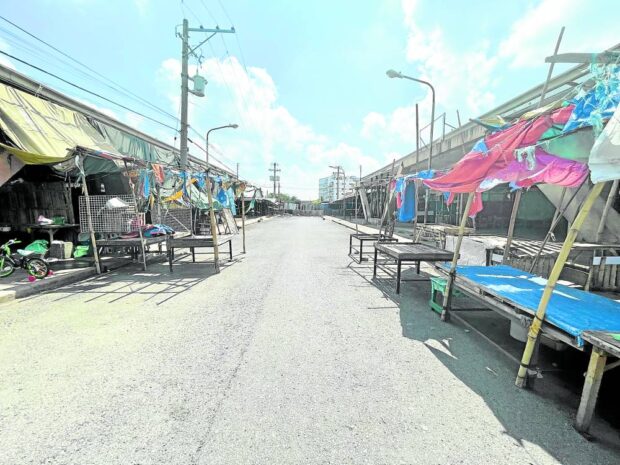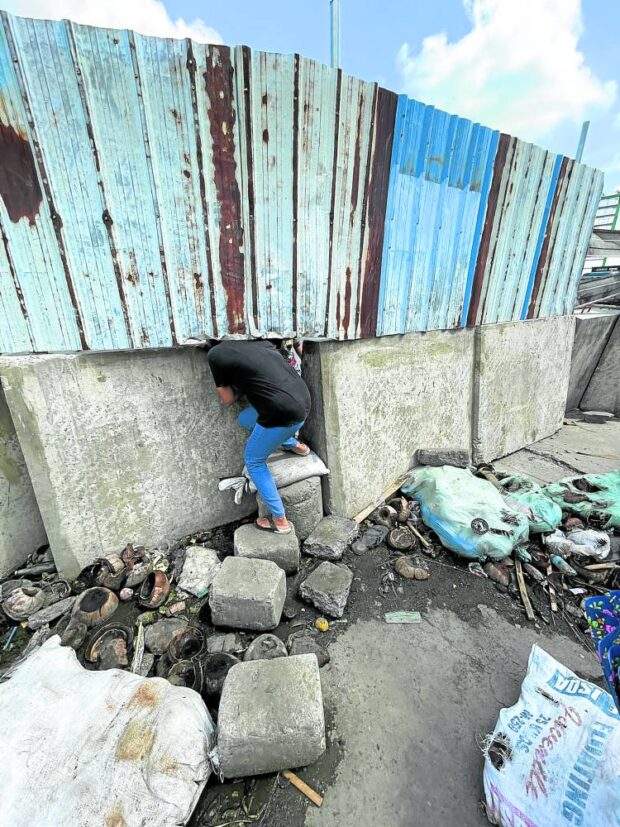Vendors lose in Tarlac City market shakeup

NO SIGN OF ACTIVITY All is quiet at the Tarlac City public market after the local government closed and fenced it in October 2022 over water pollution and lack of business permit by a private operator. —PHOTO BY TONETTE T. OREJAS
(First of two parts)
TARLAC CITY — Not two decades after the Local Government Code of 1991 (Republic Act No. 7160) tasked local government units (LGUs) to provide or run public markets, the law’s principal author sought to craft a national market code.
Then Sen. Aquilino Pimentel Jr. pushed for the passage of Senate Bill No. 279 in the 14th Congress (2007-2010), saying that “certain major problems existing in majority of our public markets covering important aspects of market operations such as location, construction, sanitation, security/safety, market fee collection and award and occupancy of stalls result in the gradual but progressive deterioration of the markets.”
In the 15th Congress (2010-2013), Senators Manny Villar and Jinggoy Estrada filed bills for a national market code and corresponding financial support. But no national market code exists until now.
While LGUs rely on local market codes, the Department of the Interior and Local Government (DILG) continued funding the construction of public markets. But the DILG has not reported on the current state of public markets or how these are even used for political patronage. A few problematic market projects tell it is not an easy matter for governance. Take the case of a market conflict in Tarlac City.
Article continues after this advertisementPoor sales
The rice grinder and coconut milk extractor at the stall of Apong Simang (she asked the Inquirer not to use her real name in this story) have been idle on most days. In the last 10 months, her daily net sales have dropped from P30,000 to a little less than P1,500, causing her to worry too much and suspect that she is suffering from depression.
Article continues after this advertisementThe two wooden tables of Oli Mangutara were almost empty, with a few packets of salt, bay leaf and pepper stacked there. Her son Sipodin left her stall, selling instead on the sidewalks as a “bolante” (ambulant vendor) to earn to buy the family’s food.
Meat trader Lita Pingol has found the rent a bit high, the roof of the new market quite low and the pipes in her stall not draining well.
Although selling separately—Apong Simang at the stalls of Baque Corp., Mangutara in Uptown, both located inside the Tarlac City Old Public Market; and Pingol in the new RUA private market nearby—they have been earning little in the last 10 months or facing uncertainty in getting long-term leases.
The extent of economic losses cannot be ascertained but these are the signs: few commodities are visible, few buyers shop and sellers demand the partial or full reopening of access roads in order to enliven sales.
The slow business stemmed from what vendors call “palengke (market) war.” It ensued after the LGU closed Uptown on Oct. 16, 2022, due to water pollution and lack of business permit by the operator, Paliparan Central Market Corp.Paliparan and the city government are now locked in a court battle.
“I don’t want to look at it as a [palengke] war because we are not waging a war against our vendors. We are giving them an alternative place where they can do business without being affected by the closure order against Paliparan,” Tarlac City Mayor Maria Cristina Angeles said in an interview on June 26.
The alternative place the mayor gave to Uptown tenants was a private market built by the Romeo U. Aquino (RUA) Construction and Development Corp. RUA is also constructing a shopping mall on an adjacent lot vacated by Uniwide.
In the disputes, the LGU has been dealing with three groups: 1,000 tenants of Paliparan who transferred from Uptown to RUA, 100 tenants of Paliparan that remained in Uptown and 40 stall renters in Baque’s lots, administrators of these market areas confirmed in interviews.
Sidewalk vendors joined protests but the LGU does not deal with those selling in spaces meant for pedestrians, which is prohibited, according to lawyer Joselito Castro, city legal officer.

Some shoppers who come to the market, where a few vendors remain, risk being hurt by using gaps in the fence and barricade to enter and leave the premises. —PHOTO BY TONETTE T. OREJAS
Lockdown
The LGU next encircled the 3-hectare public market with concrete barriers and galvanized sheets, stopping Paliparan’s operation and eventually, commercial activities there. Some sellers and buyers enter crevices, at the risk of being injured.
Paliparan’s case for a temporary restraining order is pending in the Court of Appeals while the city government sought to void Paliparan’s 25-year lease agreement that was signed in 2014 under then Mayor Gelacio Manalang.
In the process, Angeles said she discovered in Uptown the existence of “cartels” that bought the rights on several stalls and then illegally subleasing these. One of them is the wife of an official from a Tarlac town whose confrontation with a renter was recorded on video.
Castro, the city legal officer, said the cartels hide their identities by not requiring tenants and vendors to get business permits.
But Paliparan administrator Ronald Asuncion denied this.
“The city is selective [as] to who will be given business permits. If you are deemed an enemy of the city, even if you have complete requirements, then your documents will be withheld,” he said.
Numbers gave hints. While Asuncion reported that 1,000 Uptown tenants went to RUA, only 464 of them have renewed their business permits while 154 others obtained new ones as of April 25, an LGU report showed.